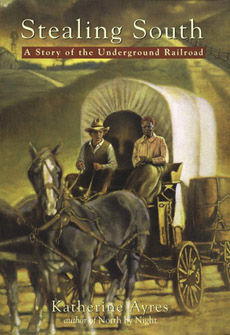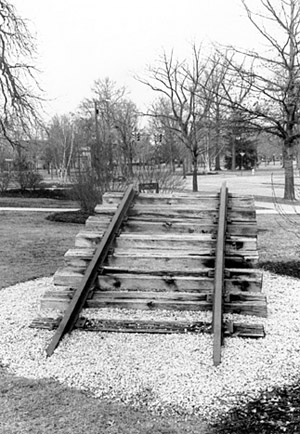Books > STEALING SOUTH

Will Spencer’s family has always helped runaway slaves passing through town as they travel the Underground Railroad. But Will is ready to leave Atwater, Ohio and start a life on his own as a peddler seeking his fortune.
When a runaway slave asks Will to help steal his
brother out of the south to keep him from being sold into the hard
life of the cotton fields, Will amends his plan and begins an adventure
that will take him into the heart of slavery’s evil.
As he makes his way from Ohio to Kentucky, Will discovers that people
are not always what they seem and it’s not always easy to tell right
from wrong.
“Katherine Ayres’ muscular Stealing South is as much about a spiritual journey as a physical trip...an intriguing, fast-paced story.”—The Denver Post
“This sequel to Ayres’ North by Night (1998), combines historical research and moral reflection with action, cumulating in an exciting escape from the slave hunters and their hounds.” —Booklist
The Story Behind Stealing South
Will you write a sequel to North by Night? That was the question my writers’ group asked once that book was finished. “No,” I said. “Lucy’s story has been told. She’s had her adventure.”
Two days later it hit me. There were four kids in the Spencer family and I’d grown quite fond of Will. The next thing you know, he was knocking on the door to my brain. “Hey, lady. Listen up. I’ve got a story to tell you. It’s a good one.
That was the beginning of Stealing South. I wrote it right after finishing North by Night, so my mind was still living in the 1850s. Because Will’s story was a traveling adventure, I needed to do more research. I spent a week in northern Ohio, traveling the roads and measuring distances, visiting small towns and soaking up the feeling of the countryside. Many things have changed in our country during the 150 years since Will’s time, but hills are still hills; hot, humid weather still feels oppressive; and poison ivy still itches like the dickens. I know, I get it.
 Students at Oberlin College created this sculpture to represent
the Underground Railroad. The tracks disappear right into
the ground.
Students at Oberlin College created this sculpture to represent
the Underground Railroad. The tracks disappear right into
the ground.
In a visit to the graveyard in Atwater, Ohio, I discovered a name: Delight Webber. She captured my imagination and I knew she belonged in the book. During the same trip, in an old, old book in the Oberlin College Library, I found an incident of an older slave woman being hit on the face with a shoe and it made me very angry. When I discovered copies of the actual runaway reward notices like the ones Will finds on the brick wall in Cincinnati I grew furious. So those parts of the story demanded a place in the book. Soon other people stepped up and took their places among the characters and the novel began to emerge.
Old Zeke, the blacksmith just showed up one day and he seemed
to be the perfect person to act as a guide to Will in the foreign
territory of Kentucky. Two years after I’d written the draft
and before it was purchased by the publisher, I read a book about
the underground railroad in which connections were drawn between
certain quilts with a wheel motif, the spiritual “Ezekiel Saw a
Wheel,” and the occupation of blacksmith. That set my spine
to tingling, for I’d named my blacksmith Ezekiel months and months
before. It seemed like the right time to push ahead with
the book and so we did.
As strong as the many voices grew in the book --- Miss Delight,
Suzanna, Old Zeke --- Will’s voice was the most emphatic. As
I shared the story, a chapter at a time, with my writers’ group,
one person asked how I did it, how had I captured the voice of
a boy living that long ago. “Did you really live back in
the 1850s?” she asked.
I didn’t of course, and at the time, while the story was still rushing at me; I didn’t want to think about where Will’s voice was coming from. Superstition, most likely, but I was afraid if I wondered too much, he might stop talking and the book would get stuck. A few weeks after finishing the first draft, however, I identified the source. Will was speaking to me in the voice of my cousin, Mark. I’d spent a chunk of time with him when I was 18 and he was 16, a boy from a small Ohio town. Like Will, he was hot-headed, full of opinions and ideas, and he had a great sense of humor.
Still, writing a guy’s story can be a challenge for a woman writer, so I asked my husband and father to read an early draft and see if they found any spots that seemed too “girly.” With the help of my cousin, father and husband, I’ve tried to tell Will’s story accurately and hope it rings true for you. One reviewer seemed to think so, describing Stealing South as “muscular.” That’s a good sign so maybe I’ll try it again.
